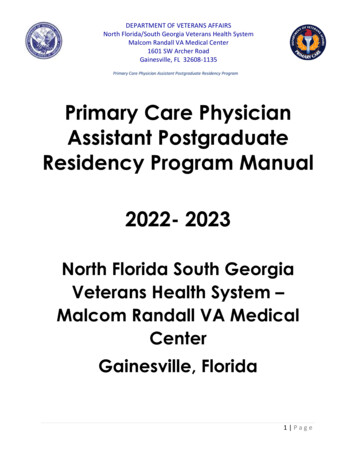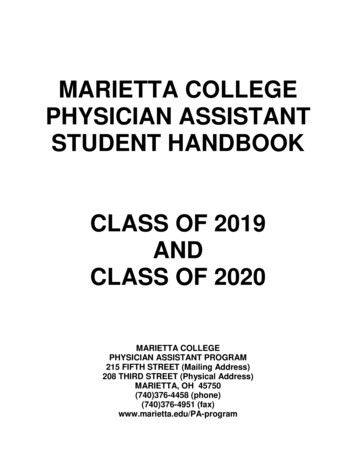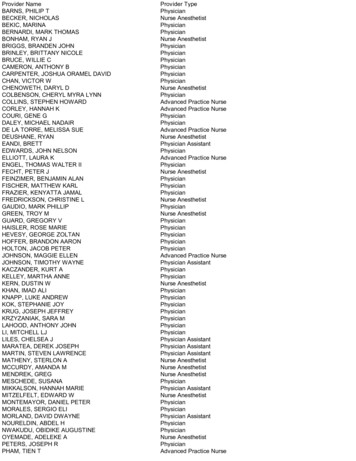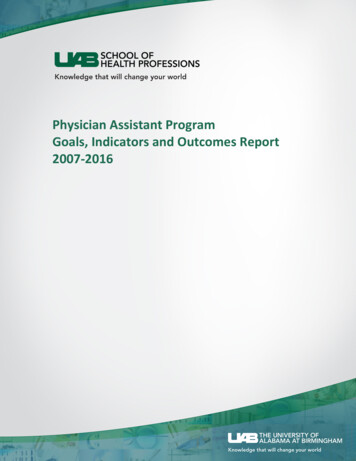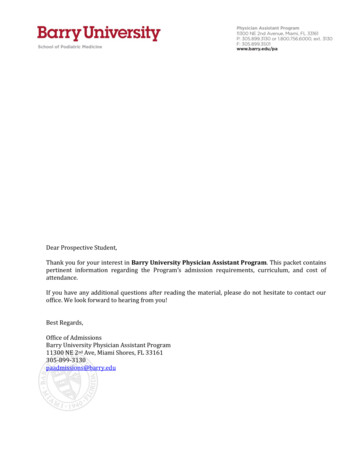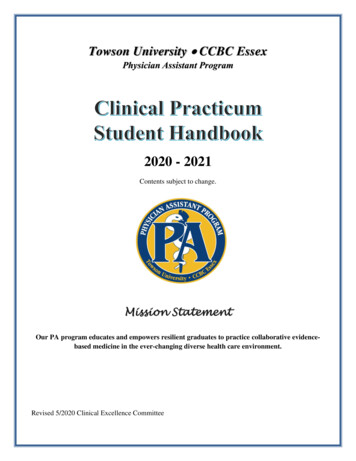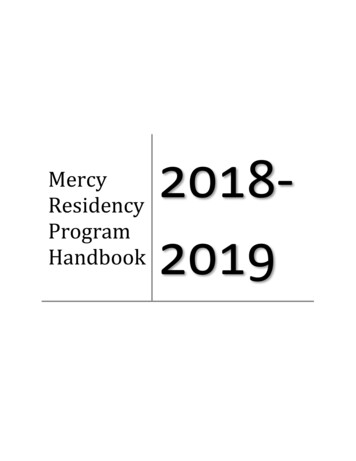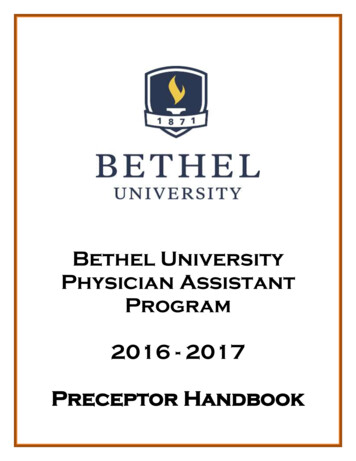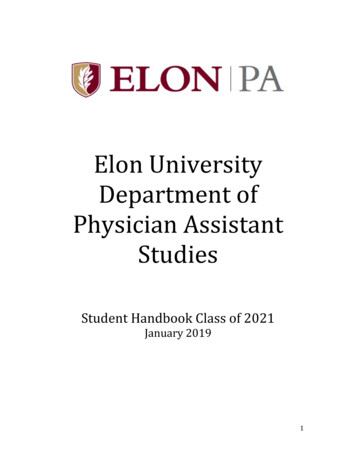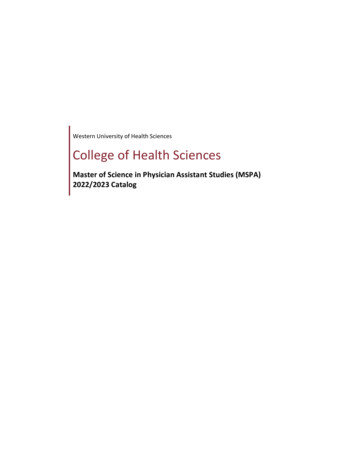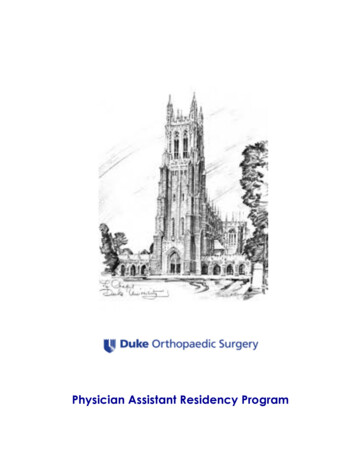
Transcription
Physician Assistant Residency Program
Orthopaedic Physician Assistant Residency ProgramStudent HandbookTable of Contents01Introduction02Program Description03Program Goals04Faculty05Program Policies06Hospital Policies07Program Evaluation08Completion and Graduation Requirements09Supervision Policy10Technical Standards11Job Scope of Practice
Orthopaedic Physician Assistant Residency ProgramProgram IntroductionWelcome to the Duke Orthopaedics PA Surgical Residency Program. TheDepartment of Orthopaedic Surgery at Duke University Medical Center is one ofthe nation’s leaders in the delivery of Orthopaedic care and resident education.We are the birthplace of the Physician Assistant profession created by Dr.Eugene Stead in the 1960s. Physician Assistants have become more and moreinvolved in the healthcare system in the many years since the first graduatingclass at Duke. Today we see Physician Assistants providing care in all specialtiesof medicine. Orthopaedics permits for a varied and rewarding career for aphysician assistant, and there are many opportunities that exist in this specialty.With the understanding that Physician Assistants require more specialized trainingin Orthopaedics to make an impact in future employment, the Department ofOrthopaedic Surgery at Duke University Medical Center has developed apostgraduate residency training program for Physician Assistants interested in acareer in Orthopaedic surgery. Duke Orthopaedics is taking the initiative tobecome one of the leaders in the training of Physician Assistants inOrthopaedics.The Orthopaedic PA residency was created through the department in October2011 with the first class beginning September 2012. The vision of extending PAresidency education into Orthopaedics at Duke University was developed byAshley Grimsley, MHS, PA-C and Raymond Malaguti, MPAS, PA-C. James Nunley,MD, MS was appointed the first medical director of the residency program. Thefirst class consists of one civilian certified Physician Assistant and one active dutyAir Force certified Physician Assistant.We are excited to offer this program as a 12 month residency that will provideboth didactic and clinical education. The resident will have first assist ORtraining, first call responsibility, extensive clinical training to provide sound skills topractice as a Physician Assistant in Orthopaedics. The resident will be exposedto all aspects and subspecialties within Orthopaedics. The Physician Assistantresident will develop the knowledge and skills to make an immediate impact ontheir postgraduate practice.
Orthopaedic Physician Assistant Residency ProgramProgram DescriptionDepartment of Orthopaedics Mission StatementOn behalf of the faculty and staff in the Department of Orthopaedic Surgery atDuke, we hope that you will find answers to the many questions you must haveabout who we are and what we do in our efforts to support our threefold mission:1. To provide compassionate, cost effective, and high quality patient careto all patients who enter our doors. This commitment extends to the families andloved ones of those who entrust us with the privilege of their health care.2. To immerse Orthopaedic surgeons in training in an environment thatchallenges and subsequently educates them across a spectrum of disciplinesincluding patient care, research, and academic pursuit.3. To perform cutting edge research that translates into improved patientcare at Duke and around the world.Orthopaedic Physician Assistant Residency Mission StatementThe Duke Orthopaedic PA Residency Program is dedicated to providing anoutstanding didactic and clinical experience to the PA resident challengingthem to grow as individuals and as clinicians. This allows that individual toprovide exceptional patient care in their career as an Orthopaedic PhysicianAssistant.Didactic CurriculumThe didactic curriculum will be on continual basis throughout the 12 monthprogram. There will be a didactic phase to each of the clinical rotations. Inaddition, the PA resident will attend the Basic Science Course along with theOrthopaedic MD residents. The PA resident will attend weekly specialty lectures,journal clubs, and seminars. They will be expected to attend weekly grandrounds and radiology conference.Clinical CurriculumThe clinical curriculum allows the PA resident to function as a first year (PGY-1)physician Orthopaedic resident. The resident will be assigned duties that willinclude history and physical examinations, writing patient orders, making roundsand recording notes in the patient chart, examining patients in the ER, orderingdiagnostic test and surgical first assisting. In addition the resident will develop
skills in fracture reduction, splinting, and casting. The resident will also haveextensive exposure to the clinic to develop physical exam skills and learn how todevelop a treatment plan. In addition the PA resident will be assigned first callresponsibilities with appropriate supervision at all times. Night and weekend callwill be assigned on a rotating basis.
Orthopaedic Physician Assistant Residency ProgramProgram GoalsThe goal of the Duke Orthopaedic Physician Assistant Residency is the enablingof the PA resident to obtain superior clinical and surgical skills in all areas ofOrthopaedic Surgery for medical practice in either an academic or communitypractice. Our goal is to foster growth as both clinician and as an individualshowing kindness and compassion to patients and staff alike.Progressive responsibility is accomplished, in keeping with individual knowledge,skills and performance, always stressing safety and appropriate patient care. Thefaculty members provide daily and continuous supervision, which is a mainstayof the program. The faculty members’ practices are all on site and rotationassignments are arranged so that residents have experience in all subspecialtyareas of Orthopaedic Surgery. Our other goal of ongoing continuing medicaleducation is assured and accomplished by teaching conferences each week,attended by faculty, residents, students and allied health personnel. The PAOrthopaedic resident has daily and continuous contact with faculty in the clinic,operating room, ward rounds, teaching conferences, and specialtyconferences.The PA resident will meet regularly with their resident advisor as well as theprogram directors to ensure they are on track with their education.Goals of the residency will be to master the fundamentals of clinical science asapplied to Orthopaedics including but not limited to:§§§§§§§§§§§SuturingFracture reduction and stabilizationFirst Assisting in OREvaluation of Clinic patients and Disease ProcessSurgical anatomyCasting/SplintingMetabolic process of bone healingSurgical pathologyWound healing and managementHomeostasisEvaluation of the Orthopaedic Trauma Patient
Orthopaedic Physician Assistant Residency ProgramProgram FacultyPA Residency Medical DirectorJames A. Nunley II, MD, MSFoot and Ankle SurgeryFormer Chair of the Department of Orthopaedic SurgeryDepartment of Orthopaedic SurgeryDuke University Medical CenterPA Residency Program DirectorRyan Clement, PA-CLead Physician Assistant Orthopaedic Trauma ServiceDepartment of Orthopaedic SurgeryDuke Regional HospitalPager (919) 970-0554Office (919) 470-7162Cell (919) 455-5782E-mail: ryan.d.clement@dm.duke.eduResident AdvisorsJohn Lohnes, PA-CSenior Physician AssistantDepartment of Orthopaedic SurgeryDuke University medical centerE-mail: john.lohnes@dm.duke.eduJoe Shinnick, PA-CSenior Physician AssistantDepartment of Orthopaedic SurgeryDuke University Medical centerE-mail: joe.shinnick@dm.duke.edu
Orthopaedic Physician Assistant Residency ProgramProgram Policiesv Prerequisites to Beginning Surgical YearØ Graduation from a PA Training Program approved by the Accreditation ReviewCommission on Education for the Physician Assistant (ARC-PA). A bachelor'sdegree is required and applicants must have passed the National Commissionon Certification of Physician Assistants (NCCPA) Certification ExaminationØ A credentialing file must be completed with Duke University Medical CenterØ Application process and licensure must be completed with the North CarolinaMedical Boardv Duty HoursØ Eighty-Hour (80) Work Week§Providing residents with a sound academic and clinical education must becarefully planned and balanced with concerns for patient safety andresident well being. Each program must ensure that the learning objectivesof the program are not compromised by excessive reliance on residents tofulfill service obligations. Didactic and clinical education must have priority inthe allotment of residents' time and energies. Duty hour assignments mustrecognize that faculty and residents collectively have responsibility for thesafety and welfare of patients and adherence to this policy. The institution iscommitted to the promotion of an educational environment, support of thephysical and emotional well being of its graduate medical residents, and thefacilitation of high quality patient care.§Duty hours are defined as all clinical and academic activities related to thegraduate medical education program, i.e., patient care (both inpatient andoutpatient), administrative duties related to patient care, the provision fortransfer of patient care, time spent in-house during call activities, andscheduled academic activities such as conferences. Duty hours do notinclude reading and preparation time spent away from the duty site.§Duty hours must be limited to 80 hours per week, averaged over a four-weekperiod, inclusive of all in-house call activities. Residents must be providedwith one day in seven free from all educational and clinical responsibilities,averaged over a four-week period, inclusive of call. One day is defined as
one continuous 24-hour period free from all clinical, educational, andadministrative activities.§Adequate time for rest and personal activities must be provided. This shouldconsist of a 10-hour time period provided between all daily duty periods andafter in-house call.v Surgical ClinicsØ Residents must attend the clinic at least once per week while rotating on any ofthe Orthopaedic specialty services.v PagersØ Pagers are issued to each resident.Ø The resident is to promptly contact the program directors should there be anyconcern regarding pager malfunction.Ø The pager must be turned on and active to the appropriate status at all timesduring the residency year. To enhance team communication and to coordinatepatient care, each resident will have the pager status assigned to: #2 “On Page”if the resident is scheduled to be in the hospital providing patient care. Thepager status may be switched to: #8 “In surgery” as appropriate. To achieveadequate intervals of rest and to avoid fatigue and resident stress the resident isto change the pager status to: #5 “Active Covering ID” whenever the resident isscheduled to be away from the hospital. The resident is to enter the coveringpager number for the in house team functional pager for the clinical service towhich the resident is assigned during the interval time when the resident isscheduled to be away from the hospital. At no time during the program is aresident’s pager status to be changed to: “Not on page”.Ø The Duke paging system has the capability to change the functional status ofthe pager.v On-CallØ The objective of on-call activities is to provide residents with continuity of patientcare experiences throughout a 24-hour period. In-house call is defined as thoseduty hours beyond the normal workday when residents are required to beimmediately available in the assigned institution.Ø In-house call must occur no more frequently than every third night, averagedover a four-week period.Ø Continuous on-site duty, including in-house call, must not exceed 24 consecutivehours. Residents may remain on duty for up to six additional hours to participatein didactic activities, transfer care of patients, conduct outpatient clinics and
maintain continuity of medical and surgical care (unless further limited by therelevant program requirements)Ø No new patients may be accepted after 24 continuous hours on duty. A newpatient is defined as any patient for whom the resident has not previouslyprovided care (unless otherwise defined in the relevant program requirements).Ø When residents are called into the hospital from home, only the hours theresident spends in-house are counted toward the 80-hour limit.v AttireØ The purpose of the dress code is to enhance a patient’s confidence in theemployees, faculty, and residents of the Department of Orthopaedic Surgery ashighly competent members of a healthcare team who are strongly committedto quality service. The residents will wear provided scrubs while in the ORotherwise, the program requires the resident staff to wear professional businessattire and short white coats in the clinics and while walking to and from theparking deck. Male attire will include khaki, tan, or blue pants with collared shirtand tie. Female attire will include pants or skirts at or below knee level withappropriate shirts. All clothes must be pressed and clean. Shoe wear in thehospital is closed toe shoes.v Record KeepingØ Residents are required to log their duty hours and procedures/OR cases daily.Compliance with this policy is mandatory. Failure to comply will result indisciplinary action.§Duty Hours: Residents are required to log in daily to record their hours. Thesehours are regularly reviewed to ensure compliance with the 80-hour workweek. It is important that your entry accurately reflects the actual hours youare in the hospital. This will be randomly audited by the program directors toensure compliance.§Procedure/OR case log: Residents are required to keep an accurate and upto date log of all procedures and OR cases. This will be reviewed by theprogram directors on a bimonthly basis to ensure compliance.§Patient Care Encounters: Residents are required to log a minimum of five (5)patient care encounters per week for all clinical rotations. This will bereviewed by the program directors on a bimonthly basis to ensurecompliance.v Resident LeaveØ The Department of Orthopaedics and the PA Orthopaedic Surgical ResidencyProgram leadership recognizes that unexpected circumstances may occur inthe life of an individual resident once the program has started. Please refer to
the Duke Human Resources website which describes the various types of timeaway from Duke: http://www.hr.duke.eduØ A meeting with the Program Directors and Medical Director is mandatory, in theevent that a PA resident believes that conditions exist to request leave from theprogram for any of the following circumstances listed on the Duke HR website:bereavement leave, jury duty, parent involvement in school, family medicalleave, personal leave of absence etc. The Duke PA Orthopaedic SurgicalResidency Program requires that the resident complete 12 months of clinicalactivity for successful completion of the program. Any resident who is unable tocomplete the requirement will have to reapply during the next scheduled sessionof candidate interviews to be considered for re-entry into the program.Ø Unplanned Absence or Tardiness. If a resident is unable to make it to work or willbe late, it is the resident’s responsibility to notify the program director and thechief resident on their service prior to the beginning of the scheduled shift. Theinformation must be relayed via direct conversation or text message. Theprogram director and medical director will review each unplanned absence orevent of tardiness. The event will discussed with the individual resident involvedand excessive unplanned absences or tardiness may result in Corrective Action.Ø Interviewing. As graduation nears, it may be necessary for the resident tointerview for positions outside of Duke. It is the responsibility of the resident toplan ahead for the scheduled interview. This planning will involve discussion withthe chief resident or the administrative chief on their service as well as directconversation with the program directors to ensure that appropriate coverage isavailable for the service during the time that the resident will be away.v Fatigue and Resident StressØ This policy is to assist the Department of Orthopaedic Surgery in its support of highquality education and safe/effective patient care. The Department ofOrthopaedic Surgery is committed to meeting the requirements of patient safetyand resident well-being. Excessive sleep loss, fatigue and resident stress areserious matters. In the event that any resident experiences fatigue and/or stressthat is interfering with his/her ability to safely perform his/her duties, they arestrongly encouraged and obligated to report this to his/her senior residentand/or supervising attending on service.Ø Appropriate backup support will be provided when patient care responsibilitiesare especially difficult and prolonged, and if unexpected needs create residentfatigue sufficient to jeopardize patient care during or following on-call periods.Ø All attending’s and residents are instructed to closely observe other residents forany signs of undue stress and/or fatigue. Faculty and other residents are to reportsuch concerns of sleepiness, tardiness, resident absences, inattentiveness, orother indicators of possible fatigue and/or excessive stress to the supervising
Attending and/or program director. The resident will be relieved of his/her dutiesuntil the effects of fatigue and/or stress are no longer present.Ø Additionally, all residents have access to the Duke Personal Assistance Service(PAS) program. The PAS provides professional counseling to Duke Faculty andstaff, and their immediate family members while maintaining confidentiality. Theservices of the PAS are free of charge, and the office can be reached at 919416-1727. More information is available at the PAS website:http://www.hr.duke.edu/pas/v Withdrawal from the ProgramØ The resident has the option to withdraw from the residency at any time withoutcause and for any or no reason and be excused from further obligation orliability provided that any such termination shall be upon at least thirty (30) days’prior written notification (the “Notification Period”). Failure by the resident togive at least thirty days’ notification will result in an unquantifiable hardship onthe Hospital and will be remedied by the resident’s payment to the Hospital ofliquidated damages equal to fifty percent (50%) of the monthly compensation atthe time of the withdrawal.
Orthopaedic Physician Assistant Residency ProgramDuke University Medical Center Hospital Policiesv Verbal OrderØ Verbal orders should be used only to meet the care needs of the patient whenthe ordering practitioner is unable to write/enter the order himself/herselfbecause he/she is not physically able to access the medical record or CPOE.Ø A non-physician is in communication with a physician by telephone or in othercircumstances in which the Doctors' Orders sheet is not accessible to thephysician. The physician orally gives specific orders for a specific patient to becarried out before a physician countersigns the orders. The non-physicianconfirms that the order was heard correctly by immediately repeating the nameof the patient and the order back to the physician (except during a Code 5)using a 'read back' system of communication. The 'read back' system is wherethe non-physician writes the order as heard and reads back to the physician theorder as written. For sound alike medications, the name is spelled back to thephysician. The physician then verifies the accuracy of the read back order. Thenon-physician writes the orders and next to them the notation, "V.O. [verbalorder] for Dr. xxxxxxxx." Under this the non-physician signs his/her own name, title,and pager ID# and the orders are then carried out. For the purpose ofinterpretation, the resident functions as an agent of the supervising physician orback up supervising physician.Ø Verbal orders must be signed by the prescribing practitioner as soon as possibleand reflective of the earlier of the following: The next time the prescribingpractitioner provides care to the patient, assesses the patient or documentsinformation in the patients medical record, or within 48 hours of when the orderwas given. The signature must be dated and timed. If the prescribing practitioneris not available to authenticate the verbal order, a covering physician maycosign the order. The signature indicates that the covering physician assumesresponsibility for the order as being complete, accurate and final. A physician'sassistant or nurse practitioner may not authenticate a verbal order given by aphysician. In this procedure, the non-physician serves only as a scribe for thephysician. This procedure may not be used unless the physician specified thename of the patient and the full and exact content of the order written. Thephysician will state the order directly to the writer, not indirectly through anothernon-physician intermediary.Ø Verbal orders may not be given for:§ Cancer chemotherapeutic agents§ Investigational drugs
Systemic thrombolytic agents. NOTE: Verbal orders may be given foralteplase (tPA) for the purpose of declotting a catheter.Initial dose of insulin.Verbal orders are limited to the attending physician for: Limitingcardiopulmonary resuscitation as witnessed by another physician and aregistered nurse. (See Doctor's Orders to Limit Cardiopulmonary Resuscitation[DNR] Procedure for details.) §§v Physician-Extender OrdersØ Under the provisions of the job description of the non-physician, the nonphysician exercises some discretion in determining which specific orders to writefor a particular patient. Under such orders, the non-physician signs his/her ownname and title and states the name of the supervising physician as follows:"(signature of writer), title, for Dr. xxxxxxx." Such orders are carried out whenwritten and thus before the specific orders come to the attention of anyphysician.Ø Orders written by nurse practitioners (NP), certified nurse midwives (CNM) andphysician assistants (PA) who have been credentialed at Duke University Hospitalfor less than six months: During the first six months as a credentialed member ofthe Health Professional Affiliate Staff, the extender will indicate the title on ordersusing the extension '-RS' for 'Requires Signature' (e.g. NP-RS, PA-RS, CNM-RS). Suchorders are countersigned by the supervising physician or back-up supervisingphysician within seven calendar days indicating date of cosignature, name, titleand pager ID. The purpose of the countersignature is to document medicalsupervision of the nonphysician.Ø Orders written by nurse practitioners (NP), certified nurse midwives (CNM) andphysician assistants (PA) who have been credentialed at Duke University Hospitalsix months or more: Such orders do not require a cosignature. The orders aresigned with the individual's name, title (NP, PA, CNM) and pager ID. Supervisionof the extender will be demonstrated through ongoing review by the supervisingphysician in accordance with state regulations and in a manner defined by thesupervising physician.v DEA NumberØ All prescriptions written in North Carolina require the prescriber’s DEA number.Resident will be given a temporary DEA (Drug Enforcement Administration)number for use while in training at Duke. These numbers are issued by theDepartment of Pharmacy and are unique to each prescriber. These DEAnumbers are valid only at authorized Duke practice sites.
Ø Ordering Narcotics. The resident is only allowed to prescribe a legitimate thirtyday supply of a controlled substance in accordance with NC Physician AssistantRegulation 21 NCAC 32S .0212 (available on the NCMB website)v Patient Confidentiality/HIPAAØ Residents are required to follow all HIPAA guidelines. Please refer to the DUMCemployee handbook for further information.v PyxisØ This is the unit that holds all the medical supplies needed on the floor (i.e. Gauze,tape, staple removers, needles, etc.) Every floor has a Pyxis, some floors morethan one. Resident will receive training and a password to access it.v ScrubsØ Duke University Medical Center will provide scrubs to residents. A Scrub Card willbe assigned. This card will be credited with three pairs of scrubs. Once the threepairs are checked out, they must be returned to gain credit toward a clean pair.v MoonlightingØ Residents are not permitted to moonlight during the residency program.v BLS and ACLSØ Current BLS and ACLS certification must be maintained at all times throughoutthe duration of the program. Copies of current BLS and ACLS certificates are tobe provided to the program coordinator.
Orthopaedic Physician Assistant Residency ProgramPerformance Evaluationv Performance Evaluation of PA Orthopaedic ResidentsØ At the end of each rotation, attending surgeons, chief residents, junior and seniorresidents, and physician assistants of their choice will evaluate the residents. Theresidents will be required to submit their names, via email, to the programcoordinator at the end of each rotation. Attached is the resident evaluationform. Required evaluation is completed by the attending surgeon and ifappropriate, the physician assistant/resident on the service. Meetings with theprogram directors and medical director will occur monthly to review evaluationsand performance, as outlined by the NC Medical Board’s policy on PhysicianAssistant supervision. The resident is required to bring the signed evaluations withthem to the meeting. Failure to do so will cause rescheduling of the meeting.v Corrective ActionØ If a resident consistently performs below expectations as evidenced by poorperformance on evaluation(s), verbal complaints by faculty or staff, or violationsof items as set forth in the resident handbook a written warning will be issued anda meeting will be held with the resident to discuss the issue. This residentcoaching session will be used to formulate a plan to correct the matter. If theresident’s performance does not improve, further disciplinary action may thenbe pursued on an individual basis. Disciplinary action may result in probation withrequired remediation and/or termination of employment. Residentinsubordination may also result in termination of employment. For moreinformation, please refer to:http://www.hr.duke.edu/policies/staff handbook.pdf
Orthopaedic Physician Assistant Residency ProgramCompletion and Graduation RequirementsCompletion of the Duke Orthopaedic Physician Assistant Residency Program is a proudachievement. It will open many avenues for job opportunities.v Requirements for graduationThe PA Resident functions as an integral part of a surgical team principally caring forpatients in the ward setting; leading rounds with tempo and precision. The residentshould demonstrate substantial achievement of the following attributes and goalsbefore graduating from the program:Ø Patient Care§ Performs appropriate focused history and physical examination withidentification of pertinent physical findings§ Effectively manage ward/post-operative patients§ Prioritize patient acuity§ Manage ward emergencies§ Prioritize clinical responsibilities§ Plan discharge§ Reliable clerical responsibilities (daily notes, discharge summaries, post-opchecks, etc)§ Responds in a timely fashion for floor rounds, has most recent data available,and presents rounds in a focused, coherent manner.Ø Operating Room§ Sterile Technique§ Draping§ One and two-handed knots with silk§ Common instrument terminology§ Timely operative notes, procedure notes, and postoperative ordersØ Medical Knowledge§ Reads basic surgical texts cover to cover§ Acquires adequate knowledge of clinical science§ Understands indications and is able to interpret relevant radiologic studies.§ Prepares for each surgical case through readings and practice of skills.
Ø Practice Based Learning and Improvement§ Ability to review published literature in critically acclaimed journals at texts.§ Apply clinical trials data to patient management§ Attends conferencesØ Interpersonal and Communication Skills§ Recognizes and follows role as part of the Care Team§ Integrates physician assistant and medical students into the Team§ Interacts appropriately with patients, family members, nursing staff, and othermembers of the care team.Ø Professionalism§ Receptive to feedback on performance§ Attentive to ethical issues§ Demonstrates leadershipØ Systems Based Practice§ Aware of cost-effective care issues§ Sensitive to medical-legal issues§ Incorporates technology/computer resources to patient carev Methods of EvaluationØ Resident Evaluations:§ PA Resident performance is evaluated after each month of clinical service bya combination of MD residents, staff Physician Assistants, and Attendings.Evaluation criteria include the resident’s performance as a technical surgeon,the management of pre-and-postoperative care issues, and their ability towork with faculty and staff.Ø Faculty/Service Evaluations:§ Residents are asked to anonymously evaluate the surgical faculty after eachassignment. The results are reviewed every three months.v Graduation CriteriaØ Incremental increase in clinical competence including performing applicableproceduresØ Appropriate increase in fund of knowledge; ability to teach others; ClinicaljudgmentØ Necessary technical skills
Ø Humanistic skills; interpersonal communicationØ Professionalism: Attendance, punctuality, availability and enthusiasm;Ø Adherence to institutional standards of conduct, rules, regulations, includingprogram standards and hospital/clinic rules with respect to infection controlpolicies, scheduling, charting, record-keeping, and delegation to medical staffØ Conference attendance – residents will be expected to attend 80% of requiredconferencesØ Record keeping – timely dictations of operative notes and patient dischargesummarie
practice as a Physician Assistant in Orthopaedics. The resident will be exposed to all aspects and subspecialties within Orthopaedics. The Physician Assistant resident will develop the knowledge and skills to make an immediate impact on their postgraduate practice. Orthopaedic Physician Assistant Residency Program
